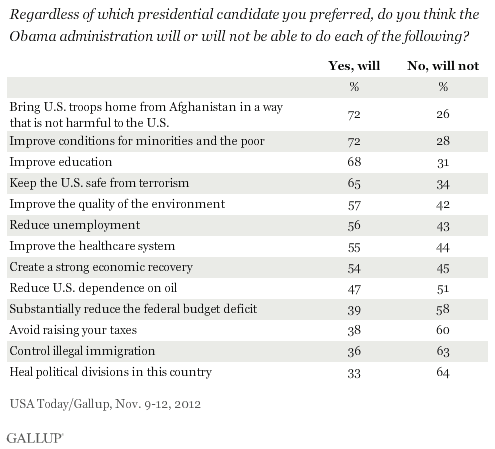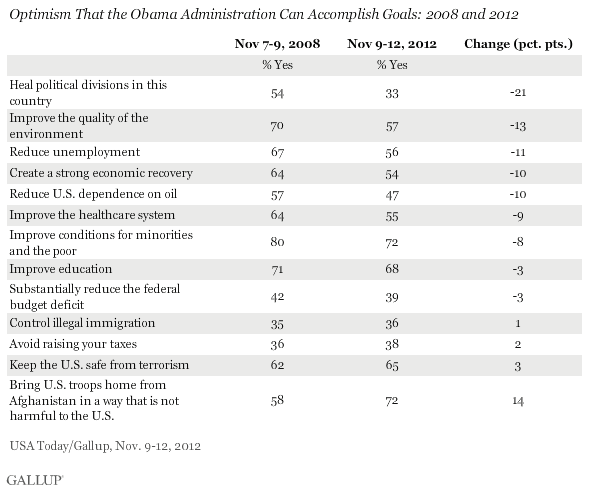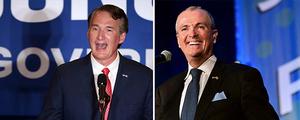PRINCETON, NJ -- Americans are most optimistic that the Obama administration will be able to bring U.S. troops home from Afghanistan, improve conditions for minorities and the poor, improve education, and keep the U.S. safe from terrorism. On two major policy issues now facing the country, however, Americans are less positive, with less than half saying the Obama administration will be able to substantially reduce the federal budget deficit or avoid raising "your" taxes.

These results are from a Nov. 9-12 USA Today/Gallup poll in which Americans were asked to say if -- "regardless of which presidential candidate you preferred" -- they thought the Obama administration would be able to accomplish each of 13 different goals.
A majority of Americans also believe that the Obama administration will be able to improve the quality of the environment, reduce unemployment, improve the healthcare system, and create a strong economic recovery.
Reflecting the bruising political battles that have characterized Washington in recent years and the recently completed contentious presidential election, Americans are least likely to say that the Obama administration will be able to heal political divisions in this country. Relatively few Americans also say that the administration can avoid raising taxes or substantially reduce the federal budget deficit.
Americans are roughly split on whether the Obama administration can reduce U.S. dependence on oil.
Americans in this same poll ranked the importance of a similar list of issues facing the country. They gave the highest priority to restoring a strong economy and job market, and it may be encouraging for the president that a majority of Americans -- 56% and 54%, respectively -- say that the Obama administration will be able to reduce unemployment and "create a strong economic recovery."
On the other hand, the administration now faces the challenge of working with Congress on efforts to avoid the mandated tax increases and spending cuts that will occur Jan. 1 if no alternative is passed. Americans are less sanguine about the possibility that the administration will avoid tax increases or that it will cut the federal deficit in a meaningful way.
Americans Generally Less Optimistic Now Than in 2008
Americans were generally more positive about the potential of the new Obama administration's ability to accomplish most of these goals in November 2008, just after Obama was elected for the first time. This optimism no doubt reflects in part voters' hopes for any new president and the poor economic conditions that were extant in 2008.

Americans' optimism has dropped the most regarding the Obama administration's ability to heal political divisions in the country. Americans are also substantially less positive about the administration's ability to improve the quality of the environment, reduce unemployment, create a strong economic recovery, and reduce U.S. dependence on oil. As noted, a majority of Americans continue to say that the administration can accomplish all of these except for healing political divisions and reducing dependence on oil.
Americans have become significantly more optimistic that the administration will be able to bring troops home from Afghanistan in a way that is not harmful to the U.S. There has been little change in optimism regarding education, terrorism, the deficit, taxes, and immigration.
Implications
It is not unusual that a new president can generate optimism about his ability to achieve major policy goals when he is first elected and before he has the challenge of actually getting down to work. Now that President Obama has four years behind him, and with significant problems still facing the country, it is perhaps natural that Americans temper their optimism about his ability to achieve certain goals in his second term. This also may reflect the reality that economic conditions -- as perceived by the public -- are not as direly negative as they were in 2008, leaving the administration less room for improvement.
Although Americans' perceptions that the Obama administration will be able to create a strong economic recovery and reduce unemployment are down from 2008, they are still above a majority level -- notable because these are the two most important issues facing the country now.
It is not surprising that Americans are less positive about substantially reducing the federal deficit because for the past four years, no long-term agreement has yet been reached on either major cuts or tax increases. Of course, the country now faces the looming fiscal cliff, and it remains to be seen whether the people's elected representatives can take meaningful action in that regard.
Survey Methods
Results for this USA Today/Gallup poll are based on telephone interviews conducted Nov.9-12, 2012, with a random sample of 1,009 adults, aged 18 and older, living in all 50 U.S. states and the District of Columbia.
For results based on the total sample of national adults, one can say with 95% confidence that the maximum margin of sampling error is ±3 percentage points.
Interviews are conducted with respondents on landline telephones and cellular phones, with interviews conducted in Spanish for respondents who are primarily Spanish-speaking. Each sample includes a minimum quota of 400 cellphone respondents and 600 landline respondents per 1,000 national adults, with additional minimum quotas among landline respondents by region. Landline telephone numbers are chosen at random among listed telephone numbers. Cellphone numbers are selected using random-digit-dial methods. Landline respondents are chosen at random within each household on the basis of which member had the most recent birthday.
Samples are weighted by gender, age, race, Hispanic ethnicity, education, region, adults in the household, population density, and phone status (cellphone only/landline only/both, cellphone mostly, and having an unlisted landline number). Demographic weighting targets are based on the March 2011 Current Population Survey figures for the aged 18 and older population living in U.S. All reported margins of sampling error include the computed design effects for weighting.
In addition to sampling error, question wording and practical difficulties in conducting surveys can introduce error or bias into the findings of public opinion polls.
View methodology, full question results, and trend data.
For more details on Gallup's polling methodology, visit https://www.gallup.com/.
